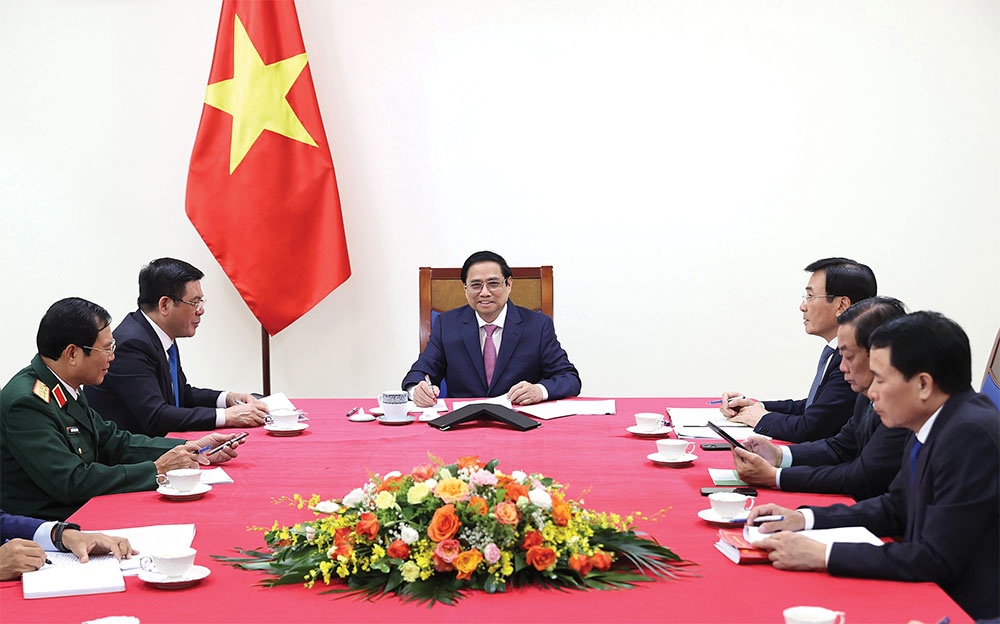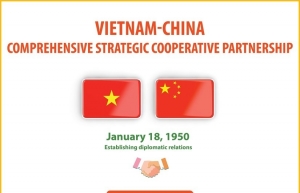Neighbours boost bilateral relationship
After four years of negotiations, Vietnam’s first container of fresh durian was officially exported a month ago to China via an international border gate in the northern province of Lang Son. In total, more than 100 tonnes of the fruit entered the Chinese market, which was packaged by Dung Thai Son Import-Export Trading JSC in the Central Highlands province of Dak Lak. The firm’s deputy general director Vu Ngoc Huy said the durian will be used as stuffing for dumplings, and for producing drinks, confectionery, and dishes.
 |
| Vietnamese PM Pham Minh Chinh held a telephone call with Chinese counterpart Li Keqiang in September |
“Our partners have ordered about 500,000 tonnes of fresh durian a year. The problem now is to expand plantations and meet all strict standards and regulations of the Chinese partner, so that we can boost exports more favourably,” Huy said.
According to Vietnam’s Ministry of Industry and Trade, within the Vietnam-China Comprehensive Strategic Cooperative Partnership, durian is only among so many types of fruit and vegetables to head to China, with many types of foodstuffs such as milk and animal-based products also heading north.
Under a protocol signed in 2019 between Vietnam’s Ministry of Agriculture and Rural Development and China’s General Administration of Customs on veterinary and health requirements for dairy products to be exported from Vietnam to China, Vietnam’s TH Group has met all strict requirements and conditions set by China, a market with a population of 1.4 billion people. At the time, TH inked an MoU on a strategic partnership with China’s Wuxi Jinqiao International Food City Co., Ltd. in which both firms will expand the presence of TH true MILK products in China.
Currently, TH Group’s sterilised yoghurt products are sold in China’s Datonghua, Jimailong, and Laopodaren supermarket chains. The group has also completed negotiations with other famous supermarket chains including Walmart, Shanmu, and Bubugaojia in China.
Figures from the General Department of Vietnam Customs showed that both nations’ bilateral trade turnover has kept increasing, hitting $131.7 billion in the first nine months of this year. China is Vietnam’s second-largest export market and the largest import market. Meanwhile, Vietnam is China’s biggest trade partner within ASEAN and the sixth-biggest trade partner worldwide.
In the first nine months of 2022, Vietnam’s exports to China reached $41.22 billion, up 6.4 per cent on-year, and its imports from China sat at $91.16 billion – up 12.6 per cent on-year. The figure sat at $165.8 billion last year, up 24.6 per cent as compared to the previous year.
According to Vietnam’s General Statistics Office, the country’s imports from China in its total import turnover have been on a rise over many years, standing at 29.8 per cent in 2019, 32 per cent in 2020, 33.1 per cent in 2021, and 33 per cent in the first nine months of this year – the rate is expected to be 33.4 per cent for the whole of 2022.
Vietnam’s exports to China cover many items, including some with an annual turnover of over $1 billion such as mobile phones and spare parts, computers, electronic products, machinery, equipment, footwear, and agro-forestry-fishery products.
Vietnam is now also an attractive destination for Chinese investments. At present, China has nearly 3,500 valid investment projects in Vietnam registered at $22.44 billion, making it the sixth-largest foreign investor in the Southeast Asian nation. In the first nine months of this year, Chinese investors registered $1.5 billion in Vietnam for both new and operational projects, and stake acquisitions, and capital contributions as well.
In 2020, Vietnam and China reached a consensus on boosting investment and trade ties, with an aim to gradually touch a 2-way trade balance and raise the latter’s high-quality investment in the former. After defining that Vietnam’s trade deficit with China remains large and needs to narrow to reach a 2-way trade balance, and noting that the implementation of some Chinese-invested projects in Vietnam remains slow, both governments have agreed to direct relevant agencies and ministries to apply drastic solutions to deal with these issues.
For example, China will import more goods from Vietnam, especially farm produce, and will also encourage investment into sectors with advanced and environmental-friendly technologies. Furthermore, both nations also agreed to deepen bilateral ties in science and technology, the environment, transport, agriculture, and healthcare, while expanding cooperation in culture, education, tourism, and people-to-people exchanges.
On September 19, Prime Minister Pham Minh Chinh held a phone call with Chinese counterpart Li Keqiang. The Vietnamese leader suggested the two countries work closely together to promote the 2-way trade growth in a stable and balanced manner.
He suggested China create favourable conditions for customs clearance, expand imports, promote market opening for Vietnamese farm produce, fully resume the operation of border gate pairs and improve the capacity of customs clearance, as well as take full advantages of opportunities brought from multilateral free trade agreements.
PM Chinh also suggested China promote high-quality investment in sectors in line with Vietnam’s sustainable development strategy, and deal with existing issues in joint projects such as the expansion of Thai Nguyen steel project’s second phase, and both the Ninh Binh and Ha Bac nitronegous fertiliser plants.
The Vietnamese leader also suggested the early opening of more commercial flights between the two countries. He expected that China would foster cooperation with Vietnam in effectively handling emerging challenges, ensure energy, food, water and cyber security and increase the sharing of experience in stabilising macro-economy, controlling inflation and boosting economic growth.
Meanwhile, Premier Li Keqiang highly appreciated and agreed with PM Chinh’s views, suggesting that both countries enhance strategic connectivity and promote economic-trade-investment ties, particularly in manufacturing and agriculture and maintenance of supply and manufacturing chains, while also urging authorised agencies of both sides to work to boost the implementation of important cooperation projects which are now being delayed.
The Chinese leader also said the Chinese side will increase the number of commercial flights between the two countries.
| Vietnamese Party General Secretary Nguyen Phu Trong is paying an official visit to China from October 30 to November 2, with the visit being made at the invitation of General Secretary of the Communist Party of China (CPC) Central Committee and President of China Xi Jinping. The visit comes after the completion of the 20th National Congress of the Communist Party of China, which ran from October 16-22. The Central Committee of the Communist Party of Vietnam sent a message of congratulations to the CPC on the congress. On October 23, Party General Secretary Nguyen Phu Trong also sent his congratulations on the re-election of Xi Jinping as General Secretary of the CPC Central Committee and the 20th CPC National Congress, especially the creative development in continuously perfecting the theoretical system of socialism with Chinese characteristics in the new era, as well as strategic visions and important goals and tasks set by the congress for the long-term development of China. He also appreciated Xi Jinping’s sentiment and attention towards Vietnam and his important contributions to Vietnam-China relations for the benefit of the two nations. The meeting with Xi would help intensify discussions on strategic issues, contributing to further strengthening political trust, and setting out major orientations for the future development of bilateral relations, the Vietnamese Party leader noted in the congratulatory message. |
 | Vietnam-China comprehensive strategic cooperative partnership Party General Secretary Nguyen Phu Trong began an official visit to China on Oct. 30 at the invitation of General Secretary of the Communist Party of China Central Committee and President of China Xi Jinping. In recent years, Vietnam-China ties have maintained a stable and positive trend. Their leaders have reached important common perceptions, helping lift bilateral ties to a new height. |
What the stars mean:
★ Poor ★ ★ Promising ★★★ Good ★★★★ Very good ★★★★★ Exceptional
 Tag:
Tag:
Related Contents
Latest News
More News
- France supports Vietnam’s growing role in international arena: French Ambassador (January 25, 2026 | 10:11)
- Foreign leaders extend congratulations to Party General Secretary To Lam (January 25, 2026 | 10:01)
- Russian President congratulates Vietnamese Party leader during phone talks (January 25, 2026 | 09:58)
- Worldwide congratulations underscore confidence in Vietnam’s 14th Party Congress (January 23, 2026 | 09:02)
- Political parties, organisations, int’l friends send congratulations to 14th National Party Congress (January 22, 2026 | 09:33)
- 14th National Party Congress: Japanese media highlight Vietnam’s growth targets (January 21, 2026 | 09:46)
- 14th National Party Congress: Driving force for Vietnam to continue renewal, innovation, breakthroughs (January 21, 2026 | 09:42)
- Vietnam remains spiritual support for progressive forces: Colombian party leader (January 21, 2026 | 08:00)
- Int'l media provides large coverage of 14th National Party Congress's first working day (January 20, 2026 | 09:09)
- Vietnamese firms win top honours at ASEAN Digital Awards (January 16, 2026 | 16:45)






















 Mobile Version
Mobile Version